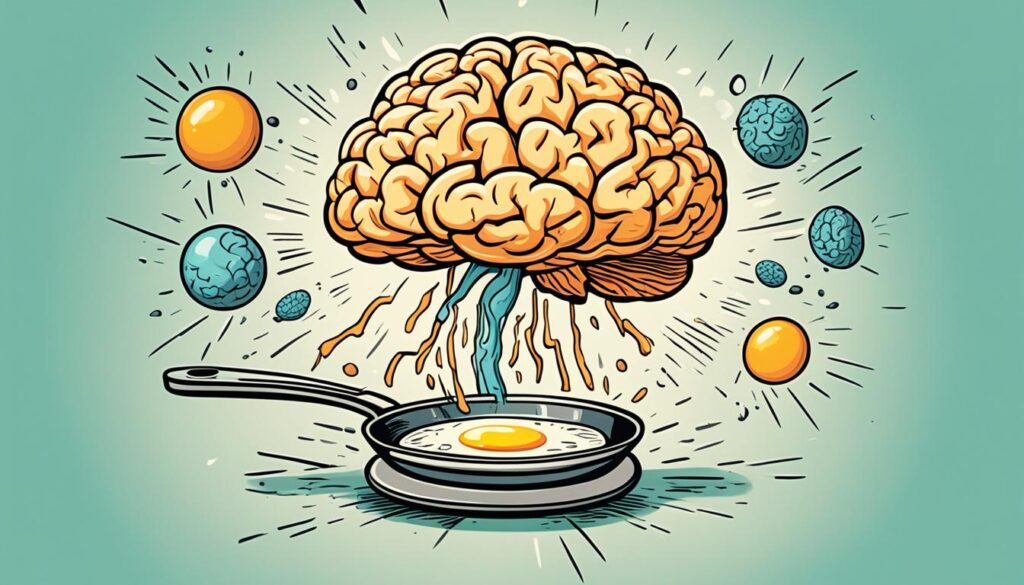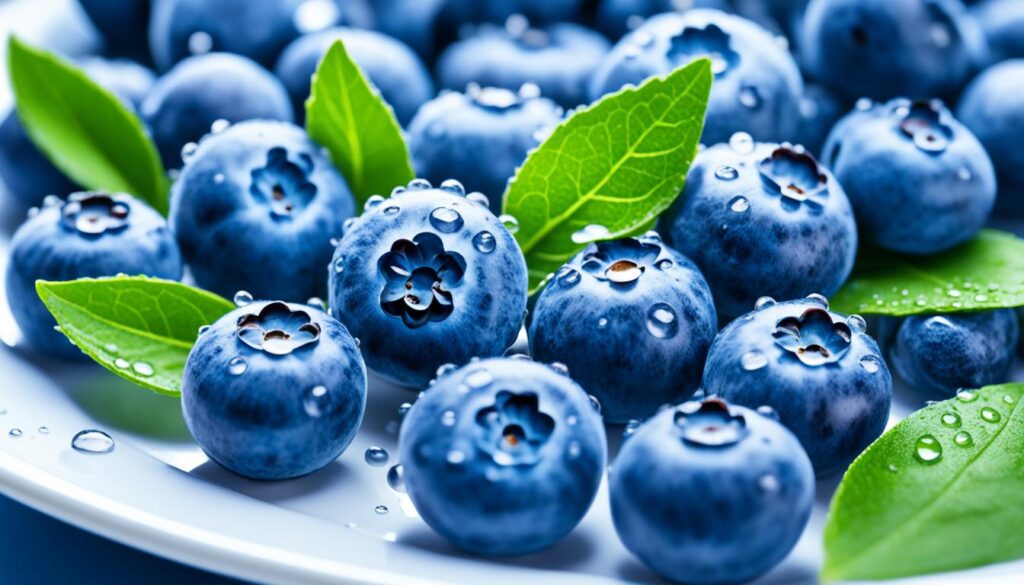Medically reviewed by Dr Chandril Chugh,
Renowned Neurologist and American Trained Specialist
The brain is a vital organ that requires proper fuel and nutrients to function well. Research shows that certain foods rich in vitamins, minerals, antioxidants, flavanols, polyphenols, and omega-3 fatty acids can help protect and improve brain health. Incorporating these foods into your diet can not only naturally enhance cognitive function but also improve overall brain health.
Table of Contents
ToggleFollowing a diet that includes brain-boosting foods can have long-term benefits for your brain. The MIND diet, a combination of the Mediterranean and DASH diets, has been found to reduce the risk of Alzheimer’s disease and dementia. By incorporating these brain-boosting foods into your meals, you can improve memory, concentration, and overall brain health.
Leafy Greens for Brain Health
When it comes to improving brain health, leafy greens are an excellent addition to your diet. Vegetables like kale and spinach are packed with essential nutrients that can benefit cognition and overall brain function.
Leafy greens are rich in several key vitamins and minerals that promote brain health. These include:
- Vitamin K: Supports brain health and may help improve cognitive function.
- Beta carotene: Converts to vitamin A, which is crucial for brain development and function.
- Folate: Essential for brain health, as it helps produce and maintain brain cells.
- Vitamin E: Acts as an antioxidant, protecting cells from damage and supporting cognitive function.
By incorporating just a handful of leafy greens into your daily meals, you can easily boost your intake of these brain-boosting nutrients. Consider adding them to smoothies, salads, stir-fries, or even as a side dish alongside your main course.
The Benefits of Leafy Greens for Brain Health
Leafy greens offer numerous benefits when it comes to brain health. Apart from their nutrient content, they have been linked to improved brain health, memory, and cognition. Studies have shown that regular consumption of leafy greens may:
- Enhance memory and attention
- Support brain cell communication
- Protect against cognitive decline
- Reduce the risk of neurodegenerative diseases such as Alzheimer’s
By incorporating leafy greens into your diet, you can nourish your brain and support long-term cognitive function. Start experimenting with delicious recipes that incorporate these nutrient-packed greens to keep your brain in optimum health.
| Leafy Greens | Vitamin K (mcg) | Beta Carotene (mcg) | Folate (mcg) | Vitamin E (mg) |
|---|---|---|---|---|
| Kale (1 cup, chopped) | 547 | 8850 | 19.4 | 1.1 |
| Spinach (1 cup, cooked) | 888 | 5733 | 263 | 1.6 |
Lamb for Long-term Cognition
When it comes to improving your brain function, lamb is a delicious and nutritious option to consider. Recent research published in the Journal of Alzheimer’s Disease suggests that consuming lamb on a weekly basis can have significant benefits for long-term cognition. Unlike other red meats, lamb has been specifically associated with improved brain health.
Lamb is widely available year-round, making it convenient to incorporate into your diet. Whether you prefer hearty stews or flavorful grilled dishes, adding lamb to your recipes is an excellent way to boost your intake of brain-boosting nutrients.

Lamb is rich in essential nutrients that support brain function, such as iron, zinc, vitamin B12, and omega-3 fatty acids. These nutrients help nourish brain cells, enhance neural communication, and promote improved brain function.
In addition to providing the necessary nutrients for optimal brain health, lamb also offers a source of high-quality protein. Protein is crucial for the production of neurotransmitters, which are essential for transmitting signals between brain cells and maintaining cognitive function.
So, next time you’re planning your meals, consider adding lamb to the menu. Not only will you enjoy a flavorful and satisfying dish, but you’ll also be nourishing your brain for improved long-term cognition.
Eggs for Cognitive Performance
Eggs are a popular breakfast food and offer numerous health benefits, particularly for brain health. Regular consumption of eggs has been linked to improved cognitive performance in adults.
Eggs are rich in choline, a nutrient that reduces inflammation and promotes brain function, including memory and communication between brain cells.
Incorporate eggs into your meals beyond breakfast, such as making savory quiches or creamy custards.

Not only are eggs a tasty and versatile ingredient, but they also provide essential nutrients that contribute to optimal brain function. Let’s explore some of the key benefits of eggs for cognitive performance:
- Choline: Eggs are an excellent source of choline, a nutrient that supports brain health. Choline helps in the production of acetylcholine, a neurotransmitter involved in memory and learning. Studies have shown that higher choline intake is associated with better cognitive performance and decreased risk of cognitive decline.
- Antioxidants: Eggs contain antioxidants such as lutein and zeaxanthin, which are beneficial for brain health. These antioxidants help protect against oxidative stress and inflammation, which can contribute to cognitive decline.
- Protein: Eggs are a high-quality source of protein, which is essential for brain function. Protein provides the building blocks for neurotransmitters and helps regulate mood and cognitive performance.
- Vitamins and minerals: Eggs are a good source of vitamins and minerals that support brain health, such as vitamin B12, folate, and selenium. These nutrients play a crucial role in the production of neurotransmitters and the maintenance of brain health.
To reap the benefits of eggs for cognitive performance, try incorporating them into your diet in various ways. Here are a few ideas:
- Make a vegetable omelet with eggs and your favorite veggies for a nutritious and brain-boosting breakfast or brunch.
- Add hard-boiled eggs to salads for a protein-packed and satisfying meal.
- Prepare a delicious frittata with eggs, cheese, and vegetables for a quick and easy dinner.
- Whip up a batch of homemade egg muffins filled with vegetables and herbs for a grab-and-go snack.
With their abundance of nutrients and potential cognitive benefits, eggs are a valuable addition to a brain-healthy diet. So, don’t be afraid to enjoy eggs beyond the confines of breakfast and explore the endless possibilities they offer for enhancing cognitive performance.
Salmon for Omega-3 Fatty Acids
Salmon is not only a great source of protein but also a beneficial food for brain health. Fatty fish like salmon are high in omega-3 fatty acids, which are crucial for brain development and function. Omega-3 fatty acids have been associated with improved brain health and a decreased risk of heart disease and arthritis.
Omega-3 fatty acids, especially docosahexaenoic acid (DHA), play a vital role in the development and maintenance of brain cells. They are essential for promoting healthy brain function and cognition at every stage of life, from infancy to old age. Research suggests that omega-3 fatty acids can support brain health by enhancing memory, attention, and overall cognitive performance.
Incorporating salmon into your diet can provide a significant boost to your omega-3 intake. Here are a few delicious and nutritious ways to enjoy this brain-boosting fish:
- Grilled salmon fillets seasoned with herbs and spices
- Salmon sushi rolls with brown rice and fresh vegetables
- Baked salmon with lemon and dill
- Pan-seared salmon served with quinoa and roasted vegetables
By including salmon in your meals regularly, you can optimize brain health and support brain development and function throughout your lifetime.

Blueberries for Improved Concentration
When it comes to enhancing concentration and promoting overall brain health, blueberries are a powerhouse. Packed with essential nutrients such as vitamin C, vitamin K, manganese, and phytonutrients, blueberries play a crucial role in supporting cognitive function. These nutrients work together to improve blood flow and oxygen delivery to the brain, resulting in sharpened focus and improved concentration.
Research suggests that incorporating a variety of vegetables and fruits, including blueberries, into your diet can have a positive impact on brain health. In fact, studies have shown that regular consumption of blueberries can lower the risk of cognitive impairment, dementia, and Alzheimer’s disease.
To reap the benefits of blueberries, consider incorporating them into your daily routine in creative ways. Add a handful of blueberries to your morning smoothie for a burst of flavor and brain-boosting nutrients. You can also experiment with making a delicious blueberry chia jam to spread on toast or enjoy as a topping for yogurt or oatmeal.
By including blueberries in your diet, you can nourish your brain and enhance concentration, all while enjoying the sweet and vibrant flavors of this superfood.

| Nutrient | Benefits |
|---|---|
| Vitamin C | Supports brain health and enhances cognitive function. |
| Vitamin K | Promotes healthy brain function and memory. |
| Manganese | Plays a vital role in brain development and protects against neurological disorders. |
| Phytonutrients | Provide antioxidant and anti-inflammatory properties, protecting brain cells from damage. |
With their rich nutritional profile and ability to boost concentration, blueberries are a delicious and valuable addition to any brain-healthy diet.
Walnuts for Countering Cognitive Decline
When it comes to brain health, walnuts are a true powerhouse. Not only do they have a delicious, nutty flavor, but they also offer numerous benefits for cognitive function. In fact, walnuts contain twice as many antioxidants compared to other nuts.
One of the key components of walnuts is alpha-linolenic acid (ALA), a plant-based omega-3 fatty acid. ALA plays a crucial role in countering cognitive decline by reducing inflammation and oxidative stress in the brain. These two factors have been closely linked to the development of neurodegenerative diseases like Alzheimer’s and dementia.
To reap the benefits of walnuts, it’s recommended to consume 1 to 2 ounces of these nuts daily. This small addition to your diet can help improve cognitive function and protect the brain from age-related decline. You can incorporate walnuts into your meals in various ways, such as adding them to salads or pairing them with roasted vegetables for a flavorful and brain-boosting meal.
Next time you’re looking for a nutritious snack, reach for a handful of walnuts. They not only satisfy your taste buds but also support your brain health and combat cognitive decline.
Spices for Antioxidant Properties
Spices are not just flavorful additions to your dishes, but they also offer antioxidant properties that can benefit your brain health. Two spices worth highlighting are turmeric and saffron.
Turmeric: Reducing Anxiety and Protecting the Hippocampus
Turmeric contains a compound called curcumin, which has been shown to have a range of health benefits, including reducing anxiety and protecting the hippocampus, an area of the brain associated with memory and learning.
Curcumin’s antioxidant and anti-inflammatory properties may help keep your brain healthy by protecting it from oxidative stress and reducing inflammation.
One study published in the Journal of Psychopharmacology found that taking a curcumin supplement for four weeks significantly reduced anxiety levels in participants. Another study published in the journal Stem Cell Research & Therapy demonstrated that curcumin can stimulate the production of new brain cells in the hippocampus, potentially enhancing memory and cognition.
Saffron: Reducing Symptoms of Depression
Saffron, often referred to as the “sunshine spice,” has been used for centuries in traditional medicine for its mood-enhancing properties. Several studies have shown that saffron supplementation can reduce symptoms of depression and improve overall mood.
Research published in the Journal of Affective Disorders found that saffron supplementation was equally effective as certain antidepressant medications in reducing symptoms of mild to moderate depression. The active compounds in saffron, including crocin and safranal, are believed to influence neurotransmitters in the brain, positively impacting mood regulation.
| Spice | Antioxidant Properties | Brain Benefits |
|---|---|---|
| Turmeric | Curcumin | Reduces anxiety, protects the hippocampus, and stimulates new brain cell production |
| Saffron | Crocin, Safranal | Reduces symptoms of depression and improves mood |
By incorporating turmeric and saffron into your cooking, you can harness the antioxidant properties of these spices to support brain health and overall well-being.
Fermented Foods for Gut-Brain Connection
Fermented foods have gained popularity for their potential benefits in promoting gut health, but did you know that they can also play a role in protecting your brain? Foods like yogurt with active cultures, sauerkraut, kimchi, and kombucha are rich in beneficial bacteria that enhance healthy gut function and contribute to overall well-being.
The gut-brain connection is a well-established concept, and maintaining a healthy gut can have positive effects on brain health. Research suggests that the diverse bacterial community in your gut can influence brain function, mood, and even cognitive abilities.
Consuming fermented foods regularly may provide brain protection by:
- Promoting a healthy balance of gut bacteria
- Reducing systemic inflammation
- Improving nutrient absorption
These fermented foods contain live bacteria that can help protect your brain, improve memory, and slow down cognitive decline.
If you’re interested in incorporating fermented foods into your diet, here are a few tips:
- Choose probiotic-rich yogurts with live and active cultures.
- Opt for unpasteurized or raw fermented foods to ensure their beneficial bacteria are intact.
- Experiment with different fermented foods like sauerkraut, kimchi, and kombucha to find what suits your taste preferences.
Remember, variety is key! Including a diverse range of fermented foods in your diet can help promote a healthy gut-brain connection and support optimal brain function.
| Fermented Foods | Benefits |
|---|---|
| Yogurt with active cultures | Improves digestion and nutrient absorption |
| Sauerkraut | Rich in probiotics and may reduce inflammation |
| Kimchi | Contains beneficial bacteria and antioxidants |
| Kombucha | Supports a healthy gut and may boost immune function |
Conclusion
A healthy diet is essential for maintaining optimal brain health and enhancing memory, alertness, and cognitive function. By incorporating brain-boosting foods into your daily meals, such as leafy greens, lamb, eggs, salmon, blueberries, walnuts, spices, and fermented foods, you can support your brain health and lower the risk of neurodegenerative diseases like Alzheimer’s and dementia.
Remember that a nutritious diet is just one piece of the puzzle. Pairing it with other healthy lifestyle choices like getting regular sleep, managing stress effectively, and engaging in mental stimulation can further promote optimal brain function and overall well-being.
So, start nourishing your brain today by incorporating these brain-boosting foods into your meals, and take proactive steps to prioritize your brain health for a sharper mind and a better quality of life.
FAQ
What are some foods that naturally boost brain health?
Foods rich in vitamins, minerals, antioxidants, flavanols, polyphenols, and omega-3 fatty acids can help protect and improve brain health. Some examples include leafy greens, lamb, eggs, salmon, blueberries, walnuts, spices, and fermented foods.
How do leafy greens benefit brain health?
Leafy greens like kale and spinach are packed with nutrients that promote brain health. They are rich in vitamin K, beta carotene, folate, and vitamin E, all of which have been linked to improved brain health, memory, and cognition.
What is the connection between lamb and long-term cognition?
Research suggests that consuming lamb on a weekly basis is associated with improved long-term cognition. Unlike other red meats, lamb specifically has shown benefits for brain health, making it a brain-boosting food choice.
How do eggs contribute to cognitive performance?
Regular consumption of eggs has been linked to improved cognitive performance in adults. Eggs are rich in choline, a nutrient that reduces inflammation and promotes brain function, including memory and communication between brain cells.
Why is salmon considered beneficial for brain health?
Salmon is a great source of protein and also contains omega-3 fatty acids, which are crucial for brain development and function. Omega-3 fatty acids have been associated with improved brain health and a decreased risk of heart disease and arthritis.
How do blueberries contribute to improved concentration?
Blueberries are rich in essential nutrients like vitamin C, vitamin K, manganese, and phytonutrients. These nutrients promote the flow of blood and oxygen to the brain, leading to improved concentration. Incorporating blueberries into your diet may lower the risk of cognitive impairment, dementia, and Alzheimer’s disease.
How do walnuts help counter cognitive decline?
Walnuts contain twice as many antioxidants compared to other nuts and are an excellent source of alpha-linolenic acid (ALA), a plant-based omega-3 fatty acid. ALA helps reduce inflammation and oxidative stress, which have been linked to neurodegenerative diseases like Alzheimer’s and dementia.
What are the benefits of spices for brain health?
Spices like turmeric and saffron possess antioxidant properties that benefit brain health. Turmeric, containing curcumin, has been shown to reduce anxiety and protect the hippocampus. Saffron supplementation has also been linked to reduced symptoms of depression.
How do fermented foods impact brain health?
Fermented foods like yogurt with active cultures, sauerkraut, kimchi, and kombucha contain live bacteria that enhance healthy gut function. The gut-brain connection is well-established, and a healthy gut can have positive effects on brain health, improving memory and slowing cognitive decline.
What role does a healthy diet play in brain health?
A healthy diet plays a crucial role in brain health and can enhance memory, alertness, and overall cognitive function. Incorporating brain-boosting foods into your diet, along with other healthy lifestyle choices, can support brain health and reduce the risk of neurodegenerative diseases like Alzheimer’s and dementia.
Source Links
- https://www.eatingwell.com/article/7920294/foods-to-eat-every-day-for-brain-health/
- https://www.cnbc.com/2022/03/12/harvard-nutritionist-shares-the-best-brain-boosting-foods-you-are-not-eating-enough-of.html
- https://www.unitypoint.org/news-and-articles/15-brain-foods-that-may-help-preserve-your-memory

Dr Chandril Chugh
Dr. Chandril Chugh is a U.S.-trained neurologist with over a decade of experience. Known for his compassionate care, he specializes in treating neurological conditions such as migraines, epilepsy, and Parkinson’s disease. Dr. Chugh is highly regarded for his patient-centered approach and dedication to providing personalized care.




